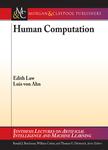版权所有:内蒙古大学图书馆 技术提供:维普资讯• 智图
内蒙古自治区呼和浩特市赛罕区大学西街235号 邮编: 010021

丛 书 名:Synthesis Lectures on Artificial Intelligence & Machine Learning
版本说明:1
I S B N:(纸本) 9781608455164
出 版 社:Morgan & Claypool Publishers
出 版 年:2011年
主 题 词:Data mining Computer programs Machine learning Human-computer interaction Artificial intelligence
学科分类:12[管理学] 1201[管理学-管理科学与工程(可授管理学、工学学位)] 081104[工学-模式识别与智能系统] 08[工学] 0835[工学-软件工程] 0811[工学-控制科学与工程] 0812[工学-计算机科学与技术(可授工学、理学学位)] 081202[工学-计算机软件与理论]
摘 要:Human computation is a new and evolving research area that centers around harnessing human intelligence to solve computational problems that are beyond the scope of existing Artificial Intelligence (AI) algorithms. With the growth of the Web, human computation systems can now leverage the abilities of an unprecedented number of people via the Web to perform complex computation. There are various genres of human computation applications that exist today. Games with a purpose (e.g., the ESP Game) specifically target online gamers who generate useful data (e.g., image tags) while playing an enjoyable game. Crowdsourcing marketplaces (e.g., Amazon Mechanical Turk) are human computation systems that coordinate workers to perform tasks in exchange for monetary rewards. In identity verification tasks, users perform computation in order to gain access to some online content; an example is reCAPTCHA, which leverages millions of users who solve CAPTCHAs every day to correct words in books that optical character recognition (OCR) programs fail to recognize with certainty. This book is aimed at achieving four goals: (1) defining human computation as a research area; (2) providing a comprehensive review of existing work; (3) drawing connections to a wide variety of disciplines, including AI, Machine Learning, HCI, Mechanism/Market Design and Psychology, and capturing their unique perspectives on the core research questions in human computation; and (4) suggesting promising research directions for the future. Table of Contents: Introduction / Human Computation Algorithms / Aggregating Outputs / Task Routing / Understanding Workers and Requesters / The Art of Asking Questions / The Future of Human Computation